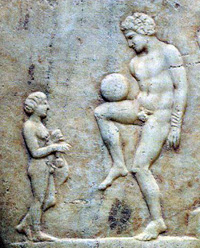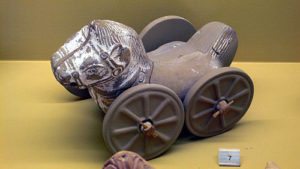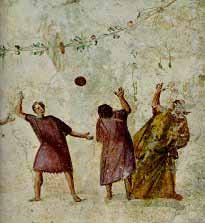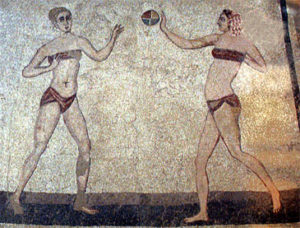Ancient Roman Games Sports are an intrinsic part of a civilization. In ancient times, Roman games usually associated with festivals and had a religious significance. Roman Olympics, fashioned after their Greek counterparts, were held on the Ides of September in honor of the god Jupiter Optimus Maximus to whom the Romans consecrated a temple on the Capitol on the same day.

These were the oldest and most magnificent of the Roman Games Sports games. They were first held for a single day. Over the course of the Republic, additional days of celebration were added both before and after the Ides.
Olympics soon gave way to secular games or the ‘Circus or Arena’ games. Circus Roman Games Sports were often intermingled with Bloodsports or Funereal sports, where participation often resulted in the one or many players’ death. Some of the major sports in ancient Rome included:
Chariot Racing
Roman passions ran high when it came to chariot racing and most supported one of the teams and its colors- the red (Russia), the green (Prasina), the white (albata) and the blue (Veneta). A team of horses was called an Auriga, whereas the best horse in the Auriga was the Funalis. The best teams were, therefore, those, in which the Auriga co-operated to best effect with the Funalis.
Ancient Roman Games Sports
The arena being sand, there were no lanes – and there was nothing which one could describe as rules. The first to complete the seven rounds was the winner. Between start and finish pretty much anything was allowed.

The chariots built purely for speed, as light as possible, and were drawn by teams of two, four or sometimes even more horses. The larger the teams of horses, the greater the expertise of the driver needed to be. Crashes were frequent and spectacular.
Gladiator fighting (Munera/ Munus)
Probably, the most popular on Roman sports, gladiator fighting was enjoyed by nobility and common-folk alike. Trained gladiators fought each other till one of them got killed. Gladiators would even be taught how to die at their gladiatorial schools. It was an essential part of the spectacle: the graceful death. A gladiator was not to plead for mercy, he was not to scream as he was killed.

He was to embrace death, he was to show dignity. More so, than just a mere demand by the audience, it also appeared to be the wish of the gladiators to die gracefully. Perhaps there was a code of honor among these desperate fighting men, which made them die in such a fashion; it no doubts restored at least some of their humanity.
The Wild Beast Hunts (Venationes)
Adding a hunt to the Munus was something which was introduced as a means by which to make the circus games yet more exciting, as, toward the end of the Republican era, the powerful vied for the favor of the public.

Starving tigers, panthers, and lions were let out of cages to be confronted in long and dangerous chases by armed gladiators. The venatio was not at a mere slaughter of animals. The animals were ‘fought’ and they did stand a slight chance of being left alive or sometimes won the mercy of the audience.
Public Executions
Public executions of criminals also formed part of the Circenses. The perhaps most popular forms of executions in the circus were spectacles which were mock plays and ended in the death of the leading ‘actor’. Alternatively, under Nero, the animals tore apart contingents of condemned and unarmed criminals: many Christians falling victim to Nero’s claim that they had started the Great Fire.
The ‘Sea Battles’ (naumachiae)
Perhaps the most spectacular form of combat was the naumachia, the sea-fight. This would involve flooding the arena, or simply moving the show to a lake. The first man to hold a naumachia appears to have been Julius Caesar, who went so far as to have an artificial lake created in order to have two fleets fight each other in a naval battle.

The battle was not fought to an annihilation of one side, although considerable losses occurred on either side. But the emperor judged both sides had fought bravely and so the battle could cease.



